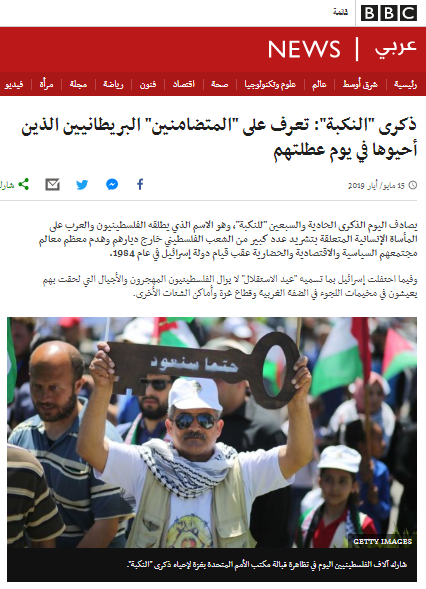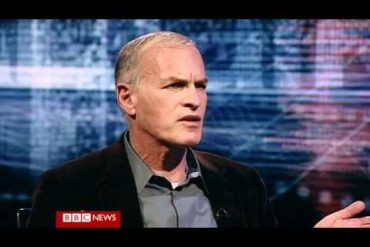As documented here last week, on May 15th the BBC Arabic website published an article about a demonstration which had taken place a few days earlier in London.
“In a sub section titled “British sympathisers” readers were told that “[t]he British capital London witnessed a mass demonstration last Saturday to commemorate the anniversary and highlight the suffering of Palestinians, especially in the Gaza Strip”. No information was given concerning the organisers of that demonstration or the fact that its speakers included a Hamas-linked professional activist.
Readers were then told that an unnamed member of staff from BBC Trending […] had met some of the demonstration’s participants in order to understand why they “give up on a day of relaxation and good times with the family to engage in political action…”.”
Five participants were interviewed and their context-free and often inaccurate claims and statements were uncritically amplified by the BBC – including an antisemitic Nazi analogy from an interviewee named as ‘Jay’.
“I was very sympathetic to the victims of the Holocaust and I visited the Jerusalem Museum [sic] to know more about them, however the fact that the Israelis commit violent acts that bear the same level of atrocity against the Palestinians is beyond my comprehension” [translation CAMERA Arabic, emphasis added]
The IHRA working definition of antisemitism includes:
“Drawing comparisons of contemporary Israeli policy to that of the Nazis.”
BBC Watch submitted a complaint on that issue and the reply we received includes the following:
“Thank you for getting in touch and your complaint in which you claim that we ‘promoted anti-Semitism’ in an article published by the BBC Arabic service.
I forwarded your email to the editors of the Arabic service…
In reply – we try, as much as possible, to cover all different angles of Arab-Israeli conflict which simultaneously doesn’t necessarily mean that angles have to be crammed into every story. At the beginning of the article in question we did mention how the two sides view and celebrate/mourn this day. This story focused on one angle due to the nature of the event, the interviewees taking part in the event and the related trend on Arabic social media. In short – our view is that any objective assessment of the coverage of Arab-Israeli conflict on the Arabic site should be based on the entirety of the coverage across different medium: TV, Online & Radio, and not judged by one single article.
Turning specifically to the allegation of ‘promoting antisemitism’, the accurate of the quote in question is: “I was, and still, very sympathetic to the victims of the Holocaust and I have visited Herzl Museum in Jerusalem to know more about them, but now I fail to comprehend the fact that Israelis are practicing violent acts on the same level of atrocity to the Palestinians”.
We don’t accept the complaint that it ‘promotes antisemitism.’ Our aim is to reflect the world as we find it and this quote was the strongly held view of the contributor, which we reported accurately. However, we have removed the quote as it does, in our view represent, an overblown comparison on the part of contributor. [emphasis added]
I hope the above clarifies the matter.”
The quote was indeed removed from the article on May 29th – two weeks after its initial publication – but with nothing added to inform readers of that fact.
Once again we see that, in addition to ignoring recommendations concerning the spelling of the word, the BBC apparently believes itself to have both the authority and the expertise to make pronunciations on what is – or is not – antisemitism.
We have in the past noted here the need for the BBC to work according to a recognised definition of antisemitism – such as that published by the IHRA over three years ago – in order to prevent the appearance of antisemitic discourse in its own content as well as on its comments boards and social media chatrooms.
And sadly, that need is still embarrassingly obvious.
Related Articles:
BBC Arabic website promotes antisemitic Holocaust analogy
IHRA adopts working definition of antisemitism: when will the BBC?




